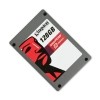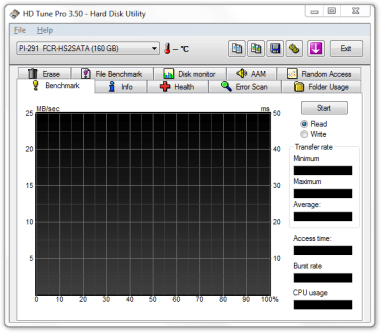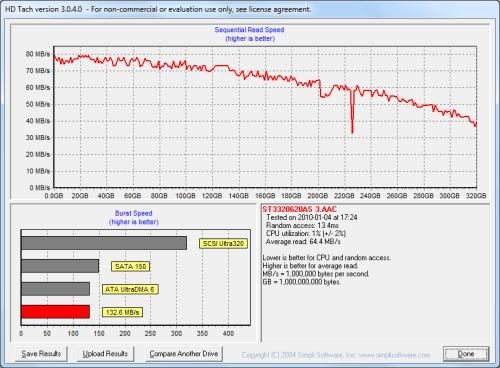- Qualcomm Launches Snapdragon 4 Gen 2 Mobile Platform
- AMD Launches Ryzen PRO 7000 Series Mobile & Desktop Platform
- Intel Launches Sleek Single-Slot Arc Pro A60 Workstation Graphics Card
- NVIDIA Announces Latest Ada Lovelace Additions: GeForce RTX 4060 Ti & RTX 4060
- Maxon Redshift With AMD Radeon GPU Rendering Support Now Available
Kingston SSDNow V Series SNV425 128GB

Like so many other memory vendors on the market, Kingston offers a wide array of solid-state disks for your perusal. For the low-end segment, it has the SSDNow V series, which at current time offer the best GB/$ on the market. We’re taking a look at the latest release here, combining a recent JMicron controller with Toshiba NAND.
Page 6 – Synthetic: HD Tune Pro 3.5, HD Tach RW3
HD Tune Pro 3.5
HD Tune has long been one of our favorite storage benchmarks, thanks in part to its ease-of-use, and its ability to deliver consistent results (which is obviously important). Since we are using HD Tune on storage devices that also house our OS, we’re unable to test the write performance, so here, we stick to both Read and Access Times.


Again as the file sizes involved decrease, so does the performance of the SNV425 SSD. While nowhere near as bad as the hard disk, it again sets a new low in the 512B, 4KB, and 64KB file size tests. Still, between 2.3MB/s or 0.036MB/s (36.8KB/s) with the hard drive, there doesn’t seem to be much comparison.
Yet again we show access times as these are the hallmark of solid-state drives, and I can’t underscore this point enough. The dirty state of the G1 leaves it with a particularly high result here, but even the G1 and other SSDs all put in results an order of magnitude better than the platter-based drive with small file reads.
HD Tach RW/3
HD Tach is a program similar to HD Tune, and although it hasn’t been updated in a few years, it’s still decent for testing SSDs. It offers a different method for calculating burst rates, as well as offering access time measurements below 0.1ms, which is unfortunately the limit for HD Tune. With a massive new program rewrite in the works, we look forward to seeing what the upcoming new version can do.


HD Tach is another program designed to measure platter-based drives (hence the downward curve in the image) but is capable of measuring access times below 0.1ms if the platform is up to the challenge. In these tests the Kingston SSD manages to deliver the highest read score, although we have to wonder about HD Tach’s testing algorithm at this point. Nonetheless as far as HD Tach is concerned this is a fast drive for reads. For the hard drive, the 13ms access latency is typical for a standard mechanical drive, but even a VelociRaptor would only decrease the latency to 7ms, a far cry from 0.1ms.
Support our efforts! With ad revenue at an all-time low for written websites, we're relying more than ever on reader support to help us continue putting so much effort into this type of content. You can support us by becoming a Patron, or by using our Amazon shopping affiliate links listed through our articles. Thanks for your support!






